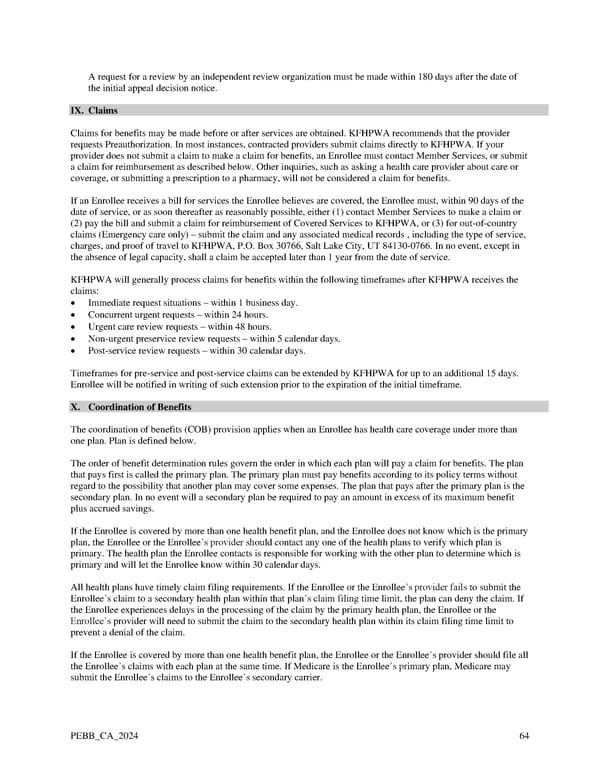A request for a review by an independent review organization must be made within 180 days after the date of the initial appeal decision notice. IX. Claims Claims for benefits may be made before or after services are obtained. KFHPWA recommends that the provider requests Preauthorization. In most instances, contracted providers submit claims directly to KFHPWA. If your provider does not submit a claim to make a claim for benefits, an Enrollee must contact Member Services, or submit a claim for reimbursement as described below. Other inquiries, such as asking a health care provider about care or coverage, or submitting a prescription to a pharmacy, will not be considered a claim for benefits. If an Enrollee receives a bill for services the Enrollee believes are covered, the Enrollee must, within 90 days of the date of service, or as soon thereafter as reasonably possible, either (1) contact Member Services to make a claim or (2) pay the bill and submit a claim for reimbursement of Covered Services to KFHPWA, or (3) for out-of-country claims (Emergency care only) – submit the claim and any associated medical records , including the type of service, charges, and proof of travel to KFHPWA, P.O. Box 30766, Salt Lake City, UT 84130-0766. In no event, except in the absence of legal capacity, shall a claim be accepted later than 1 year from the date of service. KFHPWA will generally process claims for benefits within the following timeframes after KFHPWA receives the claims: • Immediate request situations – within 1 business day. • Concurrent urgent requests – within 24 hours. • Urgent care review requests – within 48 hours. • Non-urgent preservice review requests – within 5 calendar days. • Post-service review requests – within 30 calendar days. Timeframes for pre-service and post-service claims can be extended by KFHPWA for up to an additional 15 days. Enrollee will be notified in writing of such extension prior to the expiration of the initial timeframe. X. Coordination of Benefits The coordination of benefits (COB) provision applies when an Enrollee has health care coverage under more than one plan. Plan is defined below. The order of benefit determination rules govern the order in which each plan will pay a claim for benefits. The plan that pays first is called the primary plan. The primary plan must pay benefits according to its policy terms without regard to the possibility that another plan may cover some expenses. The plan that pays after the primary plan is the secondary plan. In no event will a secondary plan be required to pay an amount in excess of its maximum benefit plus accrued savings. If the Enrollee is covered by more than one health benefit plan, and the Enrollee does not know which is the primary plan, the Enrollee or the Enrollee’s provider should contact any one of the health plans to verify which plan is primary. The health plan the Enrollee contacts is responsible for working with the other plan to determine which is primary and will let the Enrollee know within 30 calendar days. All health plans have timely claim filing requirements. If the Enrollee or the Enrollee’s provider fails to submit the Enrollee’s claim to a secondary health plan within that plan’s claim filing time limit, the plan can deny the claim. If the Enrollee experiences delays in the processing of the claim by the primary health plan, the Enrollee or the Enrollee’s provider will need to submit the claim to the secondary health plan within its claim filing time limit to prevent a denial of the claim. If the Enrollee is covered by more than one health benefit plan, the Enrollee or the Enrollee’s provider should file all the Enrollee’s claims with each plan at the same time. If Medicare is the Enrollee’s primary plan, Medicare may submit the Enrollee’s claims to the Enrollee’s secondary carrier. PEBB_CA_2024 64
 Kaiser Permanente WA Classic EOC (2024) Page 63 Page 65
Kaiser Permanente WA Classic EOC (2024) Page 63 Page 65